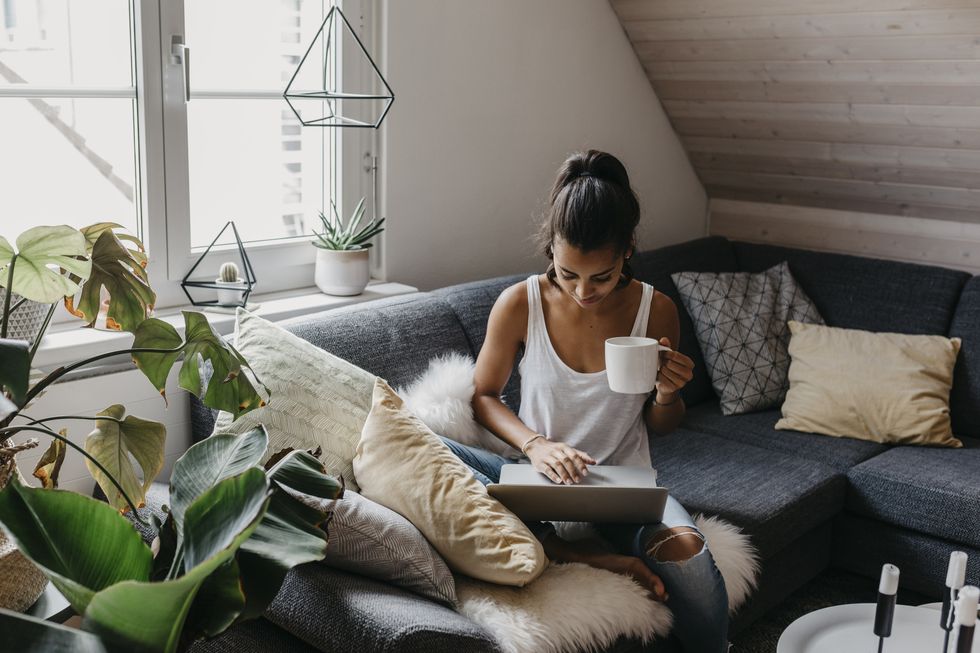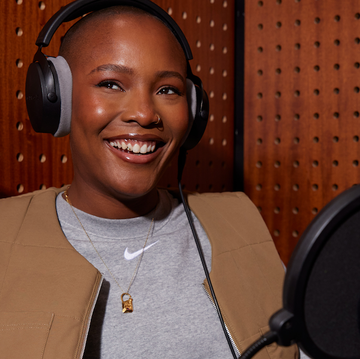We’ve all endured the emotional rollercoaster of the past year and as we emerge from lockdown, taking care of ourselves, both physically and mentally, is more important than ever.
Wearing a smartwatch like the Fitbit Sense is a move in the right direction. Fitbit does more than track your steps, focusing on four key pillars of health (activity, sleep, nutrition and mindfulness) to give you the deepest understanding of your body and guide you to wellness.
To get us started, we asked the experts for their tips on practising a little self-care – and why focusing on these pillars of holistic health can make a big difference to feeling good and more in control of your wellbeing.
1. Start your day off right
‘The past year has made us realise that we don’t constantly need to be “switched on”. Our brains and bodies aren’t made for it; they become tired and this increases stress levels and has an effect on our gut. To nourish your gut microbes and kick-start digestion, begin your day with a good breakfast. Try high-fibre, no-added-sugar granola topped with live prebiotic yogurt.’ Dr Megan Rossi, founder of gut-loving food brand Bio&Me
2. Boost your endorphins
‘Exercise – whether it’s a brisk walk, a run or a workout class – can stimulate the production of endorphins, the body’s natural mood elevators. And moving our body has the power to draw our attention away from our busy minds, providing relief from overthinking. What can really make the difference, though, is to tune into your needs and move according to your mood. A HIIT class may be what you need to release tension. Or try a yoga flow to exhale the stress and feel more centred. Do what feels good for you in that moment and you’ll reap the benefits.’ Chiara Lewis, PT and founder of TotalBody Studio
With the Fitbit Sense, you can track heart rate variability (the variation of time between each heartbeat) to see if your body is showing potential signs of stress, illness or fatigue. Just view your nightly average and trends over the past week on the Health Metrics dashboard in the Fitbit app.
3. Reframe negative thoughts
‘Stress can cause negative inner chatter. Thoughts like, “I’m just not going to be able to do this,” leave people feeling as though there are no options. When we ask ourselves better questions, we open our minds to finding new ways to behave, instead of limiting ourselves. Reframe negative thoughts as a question, like asking yourself, “How can I do this?” This opens up your thinking at the conscious and subconscious level.’ Rebecca Lockwood, neuro-linguistic programming trainer
4. Take a breath
‘Don’t underestimate the physiological power breathing has for immediately reducing our stress response – and it doesn’t need to be complicated or overwhelming. Just by taking slow, deep breaths, you’ll activate the parasympathetic nervous system, letting your body know it’s safe. Try this exercise called “box breathing”. Find a window or a frame to look at to help you focus and breathe in, counting one, two, three, four; hold for one, two, three, four; and breathe out for one, two, three, four. The main aim is to slow your breathing down. Repeat for several minutes, as it might take a little time to feel the effects. Perseverance is key.’ Elaine Carnegie, workplace wellbeing and mental health consultant
The EDA Scan app on Fitbit Sense can help you to understand how your body responds to stress. By adding a guided mindfulness session, you can build a practice that can help you to manage stressful situations more easily. The smartwatch can also be used to measure your breathing rate while you sleep, so you can learn if there are signs of significant changes.
5. Harness calming colours
‘All colours radiate their own energies. Low-energy colours like lavender, mint and baby blues have soothing properties that promote feelings of tranquillity, making them ideal for alleviating stress. Incorporate them into your wardrobe, bring them into the soft furnishings in your home or paint your nails in them so that you can harness their energy on a daily basis to boost your wellbeing, helping you stay balanced and calm.’ Momtaz Begum-Hossain, modern colour theorist
6. Drink it up
‘Switch your coffee or tea for a caffeine-free alternative. Caffeine can contribute to increases in the stress hormone cortisol, and for those who are susceptible to stress and anxiety, it may contribute to negative symptoms, leaving you feeling wired. Try a herbal tea, decaffeinated coffee or coffee alternative instead.’ Jenna Hope, nutrition consultant
7. Get more rest
‘Allowing our bodies and minds to rest at the end of each day is key to handling stress. The best way to improve sleep is through good sleep hygiene. Maintain a regular bedtime and wake-up time and create your ideal sleep environment through comfortable bedding, the right lighting and temperature. Avoid alcohol and spicy or sugary foods for three hours before bedtime and caffeine for at least five hours. Natural light exposure in the morning is crucial, and you should minimise exposure to the blue light from electronic devices in the evening.’ Ana Brito, expert somnologist at Sleep 8
The Fitbit Sense allows you to see the time you spend in light, deep and REM sleep and gives you a daily Sleep Score. View your score (which ranges from 1 to 100) in the Fitbit app for insight into your sleep quality based on heart rate, restlessness, time awake and sleep stages so you can work towards a better night of shut-eye.
Learn how to tune into your body and get better rest with Sense – visit fitbit.com to find out more
















